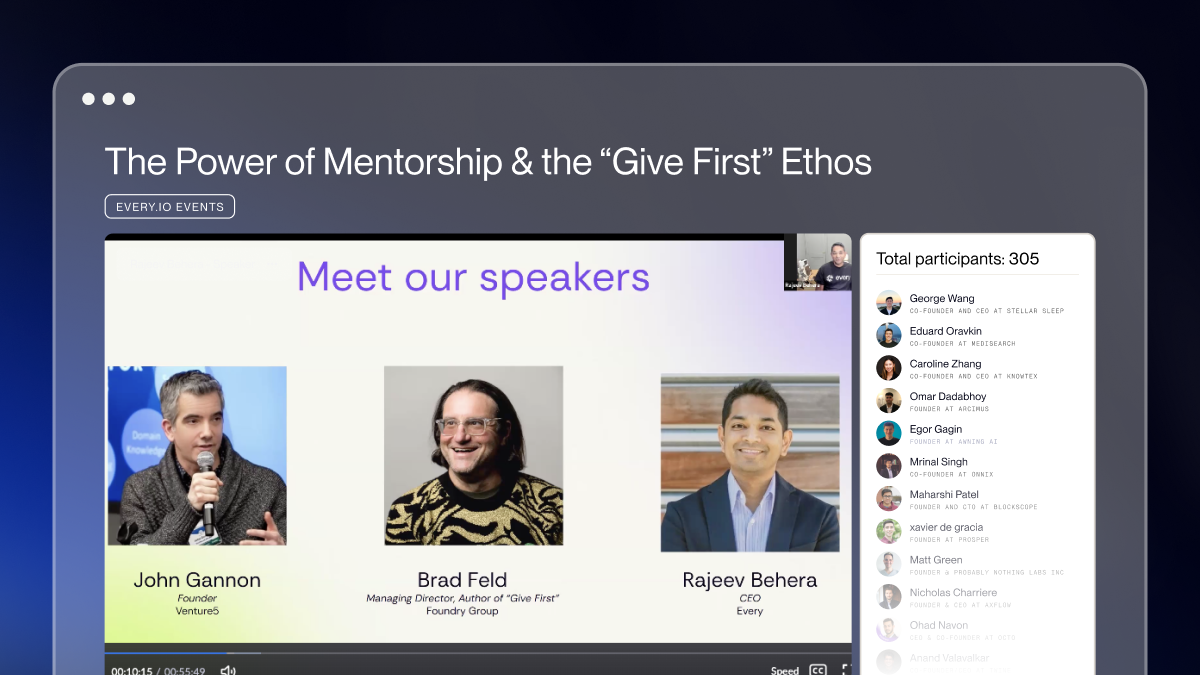Three ways to build a mentor relationship that actually works

As a startup founder, particularly a first-time founder, it can be difficult to know what to do—who to speak to, where to focus, and what to build.
Great mentors are invaluable as they not only provide founders with guidance in times of uncertainty, but can also turn a founder’s hard work and preparation into transformative opportunities, such as a warm introduction to a prominent investor or a key leadership hire.
The benefits of having a mentor is not news to startup founders–thought leaders such as Fred Wilson and Adam Grant have been discussing mentorship for years, and founders such as Mark Zuckerberg have spoken about their own experiences with mentors at length. But nonetheless, not all founders are able develop mentor relationships that actually accelerate the growth of their companies and careers.
Every CEO Rajeev Behera recently had the chance to sit down with Brad Feld, legendary entrepreneur and investor, and John Gannon, founder of Venture5 Media, to discuss how they’ve approached mentor/mentee relationships throughout their careers. Here are three tips they shared for cultivating mentor relationships that can drive both personal and professional growth.
Give first
Brad Feld explains that the philosophy underpinning successful mentor/mentee relationships, as well as startup communities in general, is to “give first.”
Giving first, the subject of Brad’s latest book, “is being willing to put energy into a system [or relationship] without knowing what you’re going to get back. However, it’s not altruism,” Brad explains. “You do expect to get something back, you just don’t know when, over what time period, or under what consideration.”
Mentor/mentee relationships are not based on a pre-defined transaction, Brad notes, but by investing in the relationship with the belief that it will offer you benefits and opportunities in the future.
This works because mentor/mentee relationships are multi-turn, positive-sum games, not isolated, zero-sum interactions. Careers, and mentor relationships, play out over a long time, and making investments in the relationship in the short term can lead to deeper trust and outsized benefits in the long term.
Rajeev adds that “when you do meet people that have done well in their careers, they’re typically not guarded about helping people. They know there’s a favor economy. You just give, and at some point someone might be in a position to help you back.”
Be authentic
When developing long-term relationships, either with mentors or investors, it’s important to be authentic to yourself. Startup trends come and go, and it’s easy to jump on the bandwagon of the ‘next best thing’ in an effort to attract mentors and investors. But “doing something that’s artificial to you,” Brad explains, “will only lead you to find the wrong people for your needs.”
If you focus on building the things that you think are going to make a difference in the world, with the cultural norms and teams you want, while also remaining inclusive and engaged, the probability of finding the right people to work with increases dramatically.
Rajeev adds that “when I think about why I’ve closed rounds, a lot has to do with confidence. And you can’t be confident when you’re not authentic to yourself.” Good investors and mentors, Rajeev explains, want to see someone who’s “uniquely bold and has unique ideas. If you try to act like someone else, you won’t look unique.”
Be conscientious
One of the most important aspects of building a strong relationship with a mentor is taking the initiative to demonstrate effort.
Having been an entrepreneur, investor, and mentor for over forty years, Brad has no shortage of people reaching out to him for mentorship and advice. In fact, he encourages it–making his email address widely available and scheduling time to respond to requests.
But Brad has found that of the many people that contact him, few are willing to put time into building a meaningful relationship. To qualify potential mentees, he began responding to requests with a simple assignment question, usually related to why the person wants to meet and what they’re expecting to get out of the meeting. Brad found that 50% of the people never responded to the assignment. 25% of people responded to the assignment, which began an email exchange. The remaining 25% of people did the assignment, took the next step, and the next step, linked it back to Brad’s world, and sent him something that takes the conversation forward. “Those are the people I want to spend time with,” Brad explains.
Being able to take information from a mentor, process it, and take action, demonstrates initiative and shows potential mentors that you value their time. John Gannon adds that the most satisfying experience for a mentor is giving a mentee advice, and having them come back later and say “‘hey, I did the thing, here’s what happened.’ That motivates me to help them even more.”
How Rajeev’s first mentor helped him raise a seed round with Andreessen Horowitz
Having a great mentor can truly make or break your career as a founder, and few stories demonstrate this better than Rajeev’s own founder journey.
“Half of a startup doing well is hard work, and then there’s always some luck that gets you further,” explains Rajeev. “A lot of my luck was my mentors helping me.”
When starting his first company, Reflektive, Rajeev admits that he had no brand, no gravitas, and no network. But his first mentor, John Pleasants, connected Rajeev with his first meeting with Andreessen Horowitz, which led to the firm later leading Reflektive’s seed round. "My mentor knew the partner that was going to fund me, and spoke so highly of me as a person," Rajeev explains. "Without that, I would not have raised money from Andreessen Horowitz.”
Beyond the education and guidance that mentors can provide, Rajeev adds that having a great mentor is like “standing on the shoulders of giants. If someone is plugged in and can help you, it’s really impactful. A little genius from someone who’s credible can go so far.”
Up to 3,500 bonus and 3% cash-back on all card spend [3], 6 months off payroll, and 50% off bookkeeping for 6 months, free R&D credit.
Frequently Asked Questions
- How do I sign up for Every?
You can get started right away—just click “Get Started” and follow a short onboarding flow. Prefer a little help? One of our specialists can walk you through incorporation, banking, payroll, accounting, or whatever you need.
- What features does Every offer?
Every gives startups a complete back office in one platform. From incorporation and banking to payroll, bookkeeping, and tax filings, we take care of the operational heavy lifting—so you can spend more time building, less time managing.
- How is Every different from other tools?
Most competitors give you software. Every gives you a full-stack finance and HR team—plus smart financial tools that actually benefit founders. Earn up to 4.3% interest on idle cash and get cash back on every purchase made with your Every debit cards, routed straight back to you.
Every is not a bank. Banking services provided by Thread Bank, Member FDIC. Your deposits qualify for up to $3,000,000 in FDIC insurance coverage when Thread Bank places them at program banks in its deposit sweep program. Pass-through insurance coverage is subject to conditions. The Every Visa Business Debit Card is issued by Thread Bank, Member FDIC, pursuant to a license from Visa U.S.A. Inc. and may be used anywhere Visa cards are accepted.
- Is my data secure with Every?
We use end-to-end encryption, SOC 2-compliant infrastructure, and rigorous access controls to ensure your data is safe. Security isn’t a feature—it’s foundational.
Can I switch to Every if my company is already set up?Yes—you can switch to Every at any time, even if your company is already incorporated and running. Whether you're using separate tools for banking, payroll, bookkeeping, or taxes, we’ll help you bring everything into one place. Our onboarding specialists will guide you through the process, make sure your data is transferred cleanly, and get you set up quickly—without disrupting your operations. Most founders are fully transitioned within a week.
- What stage of startup is Every best for?
Every is designed for startups from day zero through Series A and beyond. Whether you're just incorporating or already running payroll and managing expenses, we meet you where you are. Early-stage founders use Every to get up and running fast—with banking, payroll, bookkeeping, and taxes all handled from day one. Growing teams love how Every scales with them, replacing patchwork tools and manual work with a clean, unified system.
We’re especially valuable for teams who want to move fast without hiring a full finance or HR team—giving founders more time to build, and fewer distractions from admin and compliance
- How long does onboarding take?
Onboarding with Every is fast and efficient. For most startups, the process typically takes between 3 to 7 days, depending on your specific needs and how much setup you already have in place.
If you're a new company, you'll be up and running quickly—getting your banking, payroll, and bookkeeping set up without hassle. If you’re transitioning from another system, our specialists will help you migrate your data, ensuring a smooth switch with no gaps or errors in your operations.
We guide you every step of the way, from incorporation to setting up automated payroll to handling your taxes—so you can focus on growing your business. Our goal is to make sure you're fully operational and confident in your back office in under a week.
Practical Questions to Ask to Ensure Your Bank is Well Managed
How much liquidity does the bank have on hand to cover unexpected withdrawals or shortfalls?
What percentage of the bank's deposits are invested in longer-term securities and loans, and what percentage is kept as cash reserves?
How does the bank diversify its investment portfolio to minimize potential losses and reduce risks?













